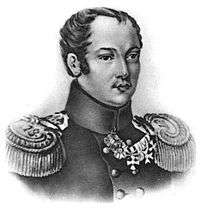Pavel Pestel

Colonel Pavel Ivanovich Pestel (Russian: Павел Иванович Пестель; July 5 [O.S. June 24] 1793 in Moscow – July 25 [O.S. July 13] 1826 in Saint Petersburg) was a Russian revolutionary and ideologue of the Decembrists.
Early life
Pestel came from a Lutheran family of Saxon descent that had settled in Russia during the reign of Peter the Great.[1] His great-grandfather, grandfather, father and uncle had all successively served as director of Moscow's postal mail service, forming a dynasty of sorts. His father Ivan (1765—1843) continued to work his way up through the political bureaucracy to become Governor-General of Siberia from 1806 to 1821.[2]
In 1805-1809, Pavel Pestel studied in Dresden. In 1810-1811, he was a student at the Page Corps, from which he would graduate in the rank of praporshchik. Pestel was then sent to the Lithuanian Regiment of the Leib Guard. He took part in the Patriotic War of 1812 and foreign military campaigns of 1813-1814. He was seriously wounded while fighting at Borodino, and for his actions personally received the Gold Sword for Bravery from Field Marshal Kutuzov. Pestel continued to distinguish himself during the following campaign at the battles of Dresden, Kulm, and Leipzig as an adjutant to Peter Wittgenstein. After serving in a number of cavalry regiments, he was in 1821 appointed commander of the Vyatka Infantry Regiment quartered in Tulchin, where the enlightened general Pavel Kiselyov welcomed liberal-minded officers.
Decembrist
In 1816, he became a member of the Union of Salvation and one of the authors of its charter. In 1818, Pestel organized a secret society called the Union of Prosperity. He managed to make all the society members agree on the republican program of the Union, thereby laying the foundations for the republican traditions in the Russian emancipation movement. At the same time, Pavel Pestel spoke in support of regicide and physical removal of all the members of the royal family. In March 1821, he established and became the leader of the Southern Society of the Decembrists. Pestel advocated the merge of the Northern Society of the Decembrists with the former and even went to Petersburg in 1824 to try to make that happen.
Starting in 1821, Pavel Pestel worked on a project of social and economic reforms in Russia, which he would later call Russkaya Pravda (Русская правда) and which would be approved as a political program. The second edition of the Russkaya Pravda manifested further democratization of Pestel’s views. It demanded an immediate emancipation of the Russian serfs with their land, limitations of the right to landownership, creation of public and private land funds, elimination of class privileges, and concession of political rights to males over 20 years of age.
Pestel was a staunch advocate of the republic and state centralization. According to his summary of the Russkaya Pravda called "Constitution. State precept" (Конституция. Государственный завет), a one-chamber People's Veche (Народное вече) was to become the legislative body. Sovereign Duma (Державная дума) was pronounced the executive branch. Supreme Sobor (Верховный собор) was given the judicial powers. In 1825, Pavel Pestel conducted negotiations with the Polish Patriotic Society, discussing the possibility of joint revolutionary actions.
On December 13, 1825, Pavel Pestel was arrested in Tulchin in relation to an attempt to assassinate Tsar Nicholas I. He was hanged with four other Decembrists in the Peter and Paul Fortress a few months later.
Descendants
Descendants of Pestel's family live in Australia and Great Britain. See also: